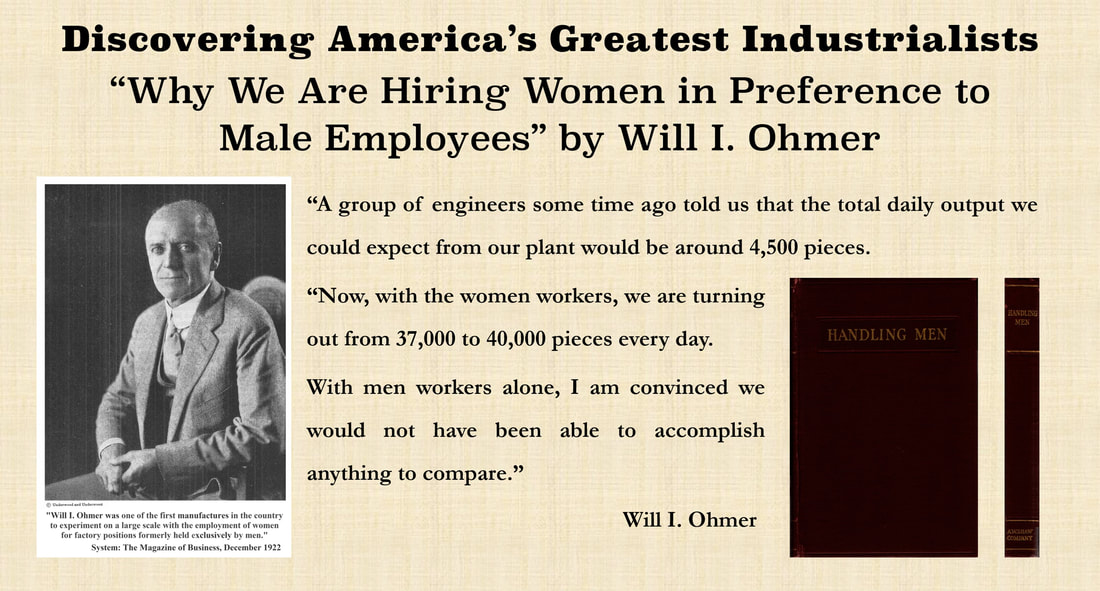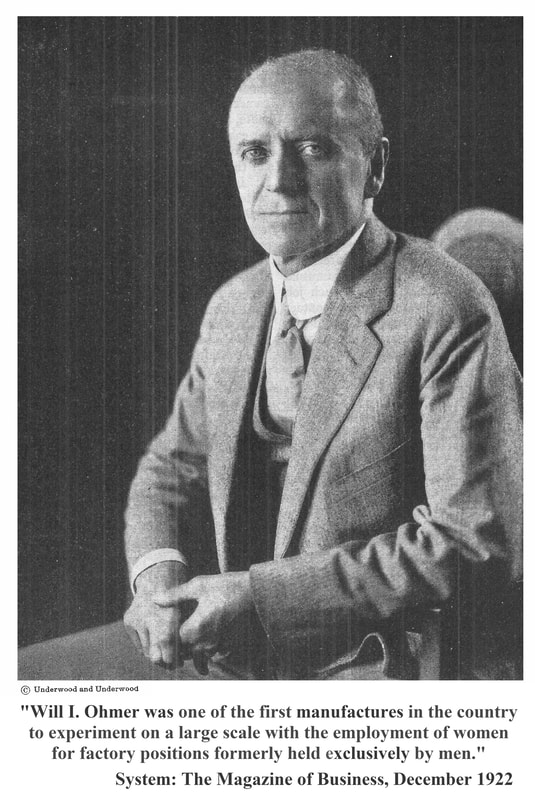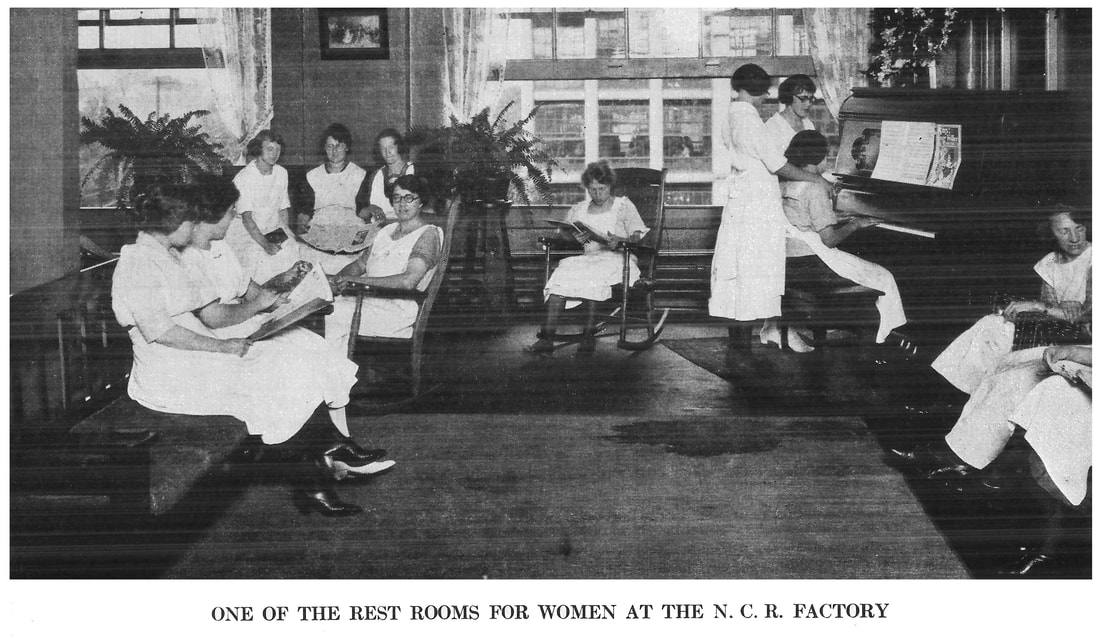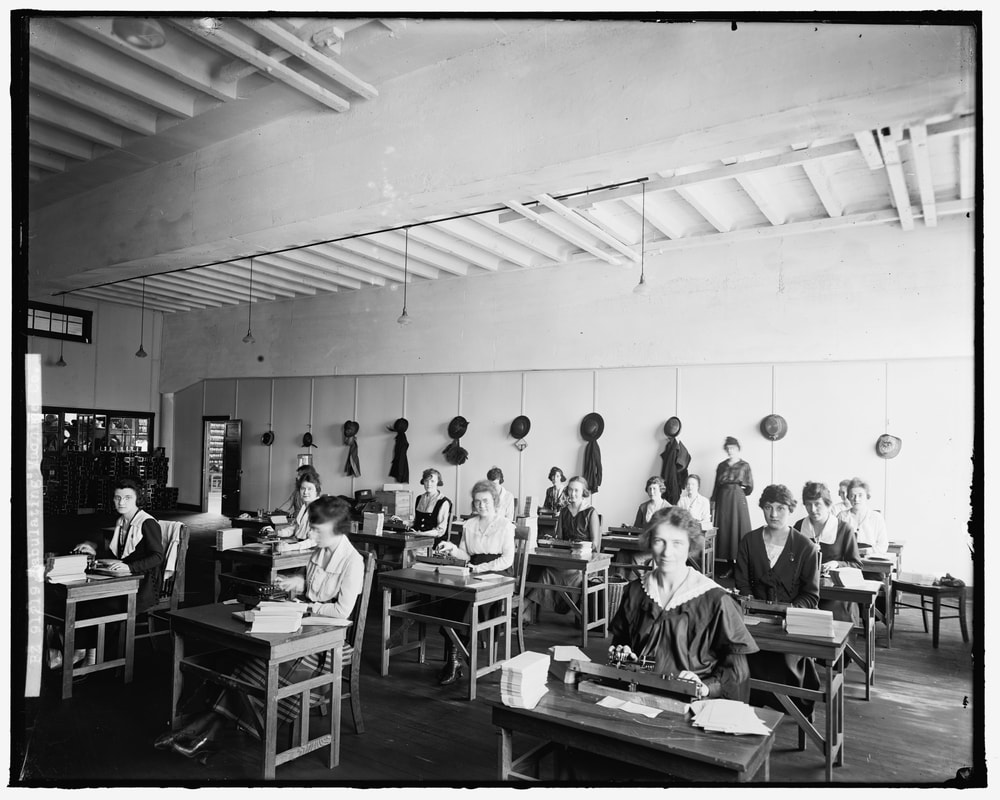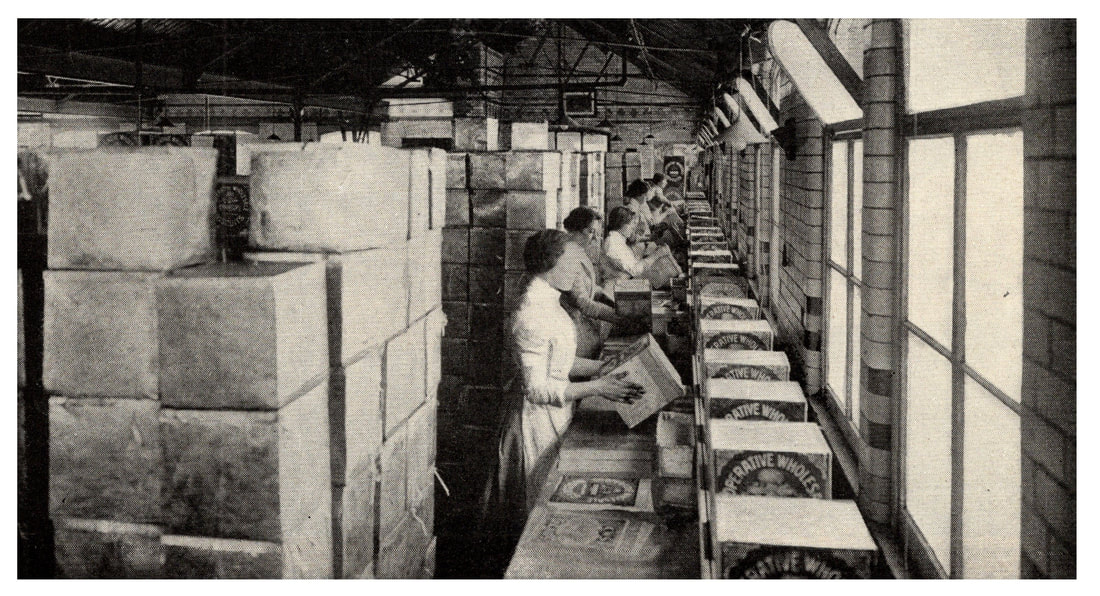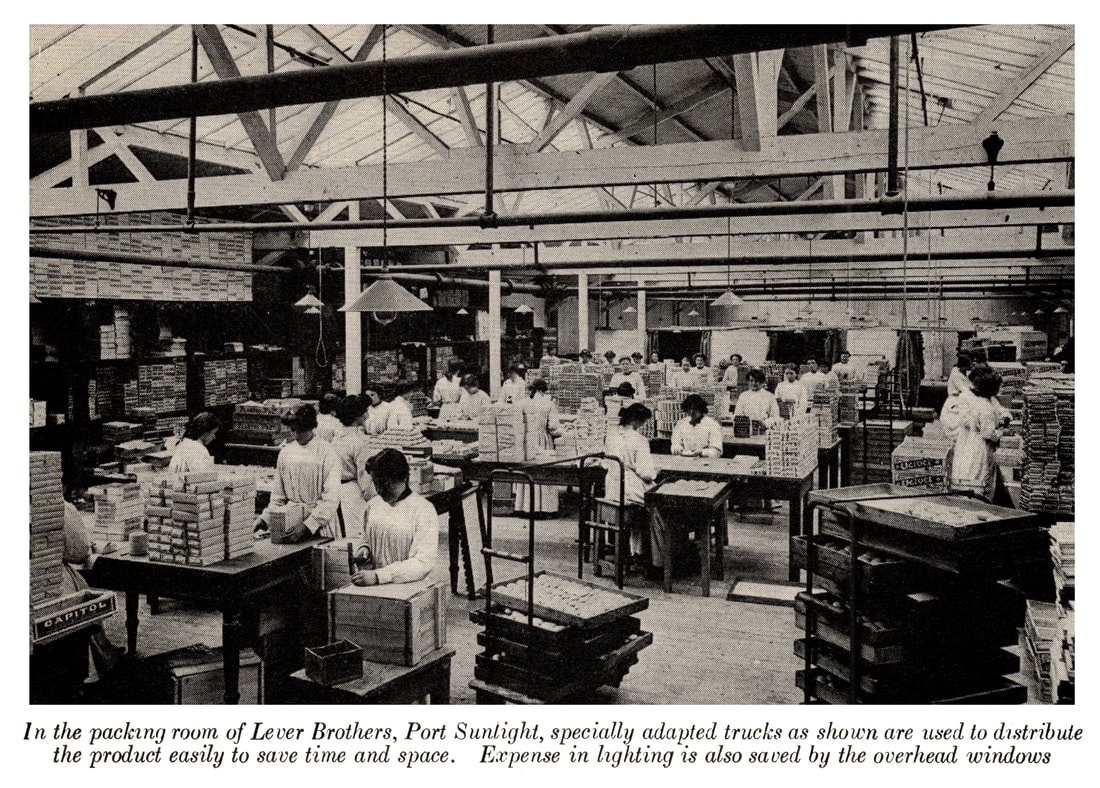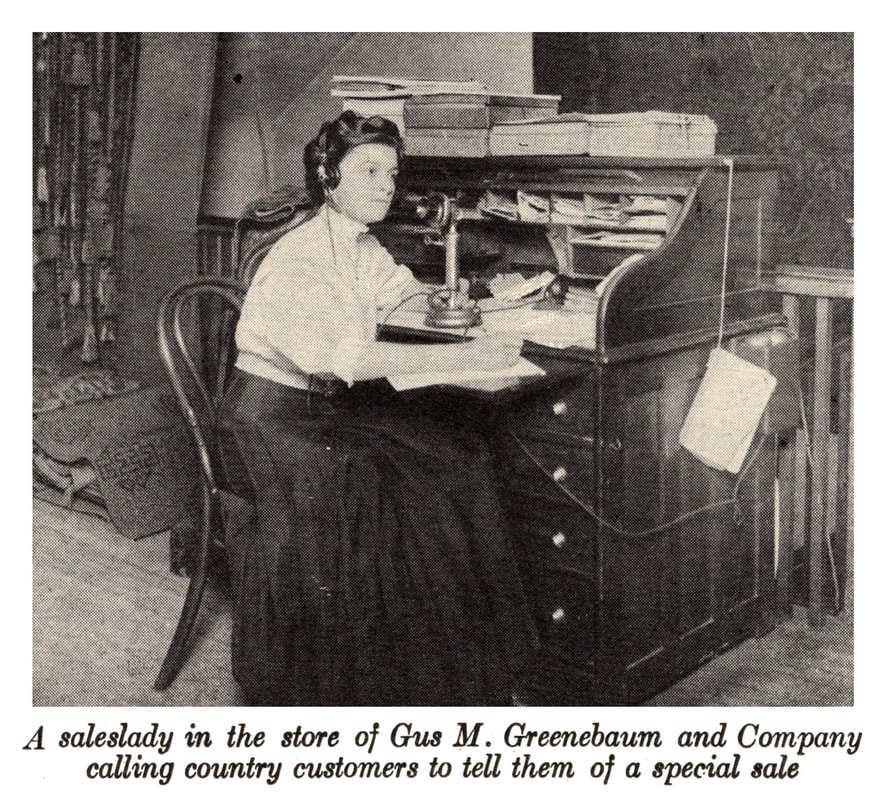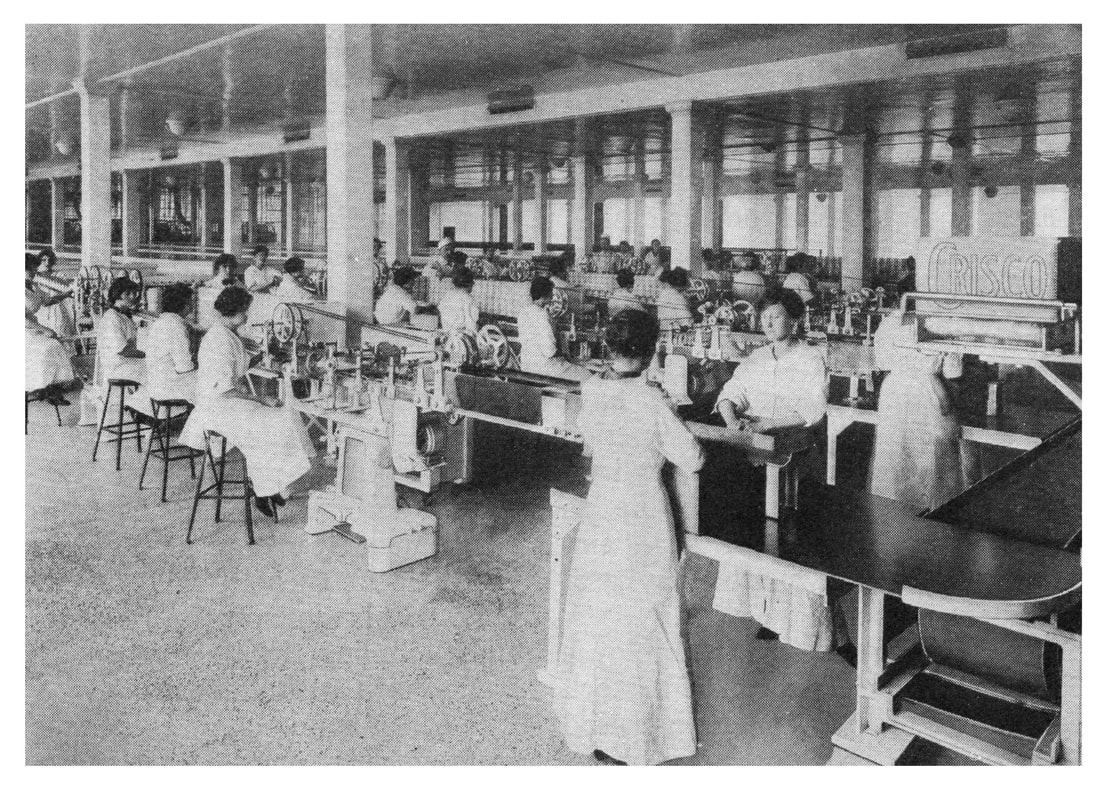Will I. Ohmer Article: "Why We Are Hiring Women"
|
|
Date Published: October 23, 2022
|
[This is an Interview in 1917 with Will I. Ohmer, President, Recording and Computing Machines Company. Headings, subheadings and images were added by this author. The article was shortened and minor edits performed where appropriate for readability without affecting the overall tone and purpose of the piece while, hopefully, improving clarity.
Some author insights are provided which were gleaned from a follow-on, 1922 article—written five years later, about this same company, this same president, this production of fuses for the war effort, and this corporation’s approach in utilizing women in its workforce.
The term “girls” has been replaced with “women” so as to keep the reader engaged and not distracted with an out-of-date term that was widely used at the time, and not in a derogatory manner.]
Some author insights are provided which were gleaned from a follow-on, 1922 article—written five years later, about this same company, this same president, this production of fuses for the war effort, and this corporation’s approach in utilizing women in its workforce.
The term “girls” has been replaced with “women” so as to keep the reader engaged and not distracted with an out-of-date term that was widely used at the time, and not in a derogatory manner.]
Peter E. Greulich
Why We Are Hiring Women in Preference to Male Employees (America, 1917)
- In a Word: "Productivity"
- Our Human Relations Practices Improve Productivity
- Women Helped Us Achieve Our Business-First Goals
- Finally: Equal Pay for Equal Work
- This Author’s Insights into Tom Watson, Traditional Founder of IBM
In a Word: "Productivity"
With their deft fingers and willing minds, women workers are assuming the positions, formerly held by men in practically all parts of our factory. The women are proving especially effective on the lighter machines and on assembly work, where dexterity rather than strength is the necessary qualification.
|
The author of this article
|
One instance in our recent experience will indicate the quantity of work which women are turning out as compared with the former output of the men.
For some time, the men on our turret lathes who were turning out standard pieces had been able to average only 190 pieces a day. By time studies, we decided it was possible for them to do about 375 pieces. We set this standard and the men were able to attain it. Not long after this, we found it advisable to employ women to work on these turret lathes. They were first put through a thorough course of training and are now regularly turning out an average of 315 pieces daily on each lathe. If you could step into almost any of our departments, I am sure you would be impressed by the beehive industry of the place. In many cases the women are actually so busy that they do not like to stop their work long enough to enter into any conversation even with their foremen. |
Not long ago, the superintendent of the factory investigated the tools on one of our jobs where some of our most expert women operators were working busily. His investigation was of such a nature it required about one-half hour and made it necessary for one of the expert girl operators to stop work. After waiting about ten minutes, she became very much excited and said: “See here, my dear man, I have to get out 500 pieces each day, and if I am interrupted like this, I can’t do it. Please let me alone and let me get to work.”
This is perhaps characteristic of the attitude of all our women workers.
This is perhaps characteristic of the attitude of all our women workers.
- A Positive Workplace Environment Improves Productivity
However, in spite of the amount of work they do, they are not overworked. In fact, they seem able to keep up their high rate of speed better than the men. In one of the assembly departments, for instance, we tried men upon a particularly trying job, and at the end of three days, they came to us and told us that the work was too strenuous.
|
We put women at the benches and there has not been any complaint.
We have rest rooms and a hospital where any of the women can go at any time during the day. We also have two rest periods, one in the morning and one in the afternoon, each ten minutes in length. I urge the women to rest during these periods and also to make as free use of the rest room and hospital facilities as they like. Recently I was walking through the plant and I noticed one of the women leaning her head on the back of her chair. I asked her what the trouble was and she said she had a slight headache. |
John H. Patterson at National Cash Register provided "rest" rooms for female employees.
|
I told her to go to the hospital but she refused. She was one—in a group of workers, who were doing assembly work, and she felt that if she dropped out, she would make it impossible for the group to take care of the entire output planned for the day.
I am glad when the women take advantage of the facilities we offer. And when they do, they often cure at once their slight indisposition, whereas if they went on working when they were not in a condition to do so, they might overexert themselves.
I am glad when the women take advantage of the facilities we offer. And when they do, they often cure at once their slight indisposition, whereas if they went on working when they were not in a condition to do so, they might overexert themselves.
Our Human Relations Practices Improve Productivity
- Training and Encouragement of Team Spirit
In order to fit the women for the various kinds of work which we expect them to do, we have a school with six women teachers. All new women are required to attend this until they are able to perform the work on which we expect to place them. Usually this takes about three days. At the end of that time, they have had practice in exactly the kind of work that we expect them to do and they are not embarrassed or nervous when they are put out in the shop to do actual work.
At one end of the room where we have the school, we have a big placard bearing these words “Women, ask questions.” Most of the women follow this advice and it is surprising how quickly they learn the various phases of the work.
We find it helpful to stimulate a friendly competition in order to get out the quantity of work which we think is proper as a regular schedule. One of the methods which we find particularly effective, for instance, is what we call our barometer of production.
At one end of the room where we have the school, we have a big placard bearing these words “Women, ask questions.” Most of the women follow this advice and it is surprising how quickly they learn the various phases of the work.
We find it helpful to stimulate a friendly competition in order to get out the quantity of work which we think is proper as a regular schedule. One of the methods which we find particularly effective, for instance, is what we call our barometer of production.
|
The barometer is merely a long sheet of cardboard, on which are drawn the outlines of six glass tubes such as are used in thermometers. Where there are four or five or six groups of women working together on a group bonus plan, we place one of these cardboard barometers in a position where all the workers can see it. Daily we draw in, in colors, the amount of work which each of the groups has done to date.
If group A, for instance, has finished 18,000 pieces to date in the current month, whereas groups B and C have done only 14,000, it is obvious that groups B and C are anxious to bring their record up to correspond with A’s. The women do take a lot of interest in these barometers. They study them each day and there is a lot of competition between the groups. |
Women employed in a tabulating machine environment in 1905.
|
Where the women are working individually, we use blackboards to show who is producing the high record for the current day. Perhaps at three o’clock the woman at machine No. 47 has turned out 900 pieces, whereas most of the other women have only done somewhere around 750. We put the high woman’s record on the board where everybody can see it and this furnishes a direct incentive for the others to bring up their output as far as possible [In multiple articles of this day, this was a common practice to improve productivity in many factories—regardless of the sex of the organization’s workforce].
At this point it might be well for me to say that the quality of our work has in no way been permitted to go down as the quantity goes up. We have inspections at every step of production, so if an error is made in the first step, the product does not go through all the other steps before the mistake is caught.
At this point it might be well for me to say that the quality of our work has in no way been permitted to go down as the quantity goes up. We have inspections at every step of production, so if an error is made in the first step, the product does not go through all the other steps before the mistake is caught.
- Human Relations in a Factory Environment
Our experience has taught us that women workers seem to require different handling than the men.
At first, we had a certain amount of difficulty with some of our foremen who were trained in handling men. They did not understand the women and tried to manage them in the same way that they had managed men. Gradually cases of this sort have been almost eliminated.
Our factory workers are, if I may say it, like a happy family. All the women know me and I know a great many of them by name. I want them to feel at home with me. The greatest pleasure I have is going among them, seeing they are happy at their work, and discussing any problem with them that may come up.
At first, we had a certain amount of difficulty with some of our foremen who were trained in handling men. They did not understand the women and tried to manage them in the same way that they had managed men. Gradually cases of this sort have been almost eliminated.
Our factory workers are, if I may say it, like a happy family. All the women know me and I know a great many of them by name. I want them to feel at home with me. The greatest pleasure I have is going among them, seeing they are happy at their work, and discussing any problem with them that may come up.
|
Any worker has the privilege to come to my office with any problem she may have at any time of the day. They do come—quite a good many of them, but they are very fair about the privilege and they have never abused it. [See Footnote #1]
I make it a point when there is any question of discipline brought up, to have all of the persons concerned brought into my office at the same time. There we thresh the thing out from start to finish, find out who is right and who is wrong, and settle the matter once and for all. I feel that it is my personal duty to help employees wherever I can. |
A packing room in 1909 of a biscuit factory showing women working a conveyor belt.
|
Not long ago, I heard indirectly about one woman who was working for us. She had several children and her husband was paralyzed. I saw the best thing I could do for her was to give her a better class of work, which I did. … I like to do these things—having our loyal workers feel that they are working in an organization where the human element is not allowed to die out in favor of making the whole factory a mere machine. …
We have various methods of keeping up the interest of the employees.
We have various methods of keeping up the interest of the employees.
- Providing More than a Paycheck
We have a large dining room which seats 1,500 people. We serve an excellent lunch at a flat rate of twenty cents a person. Often, we move the tables and have informal dances in which many of the workers take part.
Not long ago we had a style show which was of direct interest to most of the women. One of the large eastern merchandisers sent on some of his professional models and we selected a half dozen or so of the women from our own organization to also serve as models. The gowns were offered as prizes for excellent work. In this particular case, the effect was so direct and immediate that the output increased 100,000 pieces in two weeks.
Not long ago we had a style show which was of direct interest to most of the women. One of the large eastern merchandisers sent on some of his professional models and we selected a half dozen or so of the women from our own organization to also serve as models. The gowns were offered as prizes for excellent work. In this particular case, the effect was so direct and immediate that the output increased 100,000 pieces in two weeks.
|
The women showed themselves what they could do when they needed to, and since that time the production has never fallen below these records.
In our dining room we have an orchestra of fifty-two pieces which is made up of our employees and it plays every day during the noon hour. In addition to this dining room, we have a cafeteria where the employees may select any food they like and pay as much or as little as they wish for their lunch. In both the dining room and the cafeteria, all the food is home cooked so that we can be sure of its wholesomeness. We serve the food at a little below cost and everything is kept perfectly clean and sanitary. |
One other thing we are doing to keep the interest of our employees is to sell them certain articles at cost. Perhaps some manufacturers do not agree with us on the wisdom of this policy and we have had kicks from merchants against what we are doing, but we have saved our employees money by making quantity purchases and reselling the articles to our employees at cost. This practice has certainly made a hit with our employees because it enables them greatly to lessen the cost of living.
For instance, we recently bought a large number of sweaters at prices ranging from thirty-eight cents to eight dollars. Many of the women and men wear these sweaters while they are at work and they appreciated the opportunity to buy them from us at the prices we paid for them. Among these sweaters were some which we sold at eight dollars of exactly the same quality that I had paid sixteen dollars for at one of the stores in Dayton.
Not long ago we bought three carloads of potatoes and resold them to our employees at one dollar and sixty cents a bushel, whereas the retail price at most stores was over a dollar above that. We have a special brand of coffee made up for us which costs us nineteen and a half cents which we sell to our employees for twenty cents. The same grade of coffee can only be bought elsewhere at from thirty-eight to forty cents. Recently we bought a carload of grapes and had no difficulty whatever in disposing of the entire lot at a price considerably under the market.
All of these methods have helped us materially to win the good will of our women workers.
For instance, we recently bought a large number of sweaters at prices ranging from thirty-eight cents to eight dollars. Many of the women and men wear these sweaters while they are at work and they appreciated the opportunity to buy them from us at the prices we paid for them. Among these sweaters were some which we sold at eight dollars of exactly the same quality that I had paid sixteen dollars for at one of the stores in Dayton.
Not long ago we bought three carloads of potatoes and resold them to our employees at one dollar and sixty cents a bushel, whereas the retail price at most stores was over a dollar above that. We have a special brand of coffee made up for us which costs us nineteen and a half cents which we sell to our employees for twenty cents. The same grade of coffee can only be bought elsewhere at from thirty-eight to forty cents. Recently we bought a carload of grapes and had no difficulty whatever in disposing of the entire lot at a price considerably under the market.
All of these methods have helped us materially to win the good will of our women workers.
- Human Relations Practices Increase Loyalty and Attract Quality Employees
The women, we find, are absolutely loyal. They do not work for us a while and then quit, which is sometimes cited as one of the objections against woman workers.
|
Not long ago one of the foremen was telling me about a woman whom he wanted to discharge. She told him that she couldn’t quit, that she needed the position and was going to stay. We found a way out of the difficulty and kept her.
Again, the women never show any desire to follow the hands of the clock and jump into their hats and coats at 5:25. They work until the last minute, eager to clean up the day’s stint and make records. Under our present conditions we are having no difficulty whatsoever in getting enough employees. As a matter of fact, we have been receiving applications at the rate of three thousand a week. |
We rented an office downtown some time ago so the women would not have to come out to the shop to see us about employment. After a short time, this office proved a failure, however. The landlord had to turn us out because there were so many women coming to the office that the elevators couldn’t take care of them.
And we get a high grade of women, too.
For instance, we have working for us now one hundred and forty women who gave up positions as school teachers to come to us. The wages are attractive enough to enable us to secure the best grade of women workers [It was noted in the 1922 article that the turnover rate for the company was “only about 4%,” which was almost unheard of at the time].
And we get a high grade of women, too.
For instance, we have working for us now one hundred and forty women who gave up positions as school teachers to come to us. The wages are attractive enough to enable us to secure the best grade of women workers [It was noted in the 1922 article that the turnover rate for the company was “only about 4%,” which was almost unheard of at the time].
Women Helped Us Achieve Our Business-First Goals
Of course, one important factor in getting the full quantity of work turned out is the organization of the work in such a way that it is “always coming.” At our assembly tables, for instance, the work proceeds from one end to the other and no one can loaf or slow up without everybody else knowing it. The work immediately accumulates at the place where the worker is slowing up.
|
It is interesting, however, as indicative of the spirit in our organization, that when the work does slow up, the women do not turn on the slow one and try to have her taken away from their group. On the contrary, they help her out as far as possible, try to show her how to do her work faster if she lacks the training, encourage her and help her if she is not feeling well, and in all ways try to realize that if they all help, she will probably be doing her full share in a short time.
At the first the men resented somewhat the employment of women workers. We still have quite a few men at various places in the factory. They are doing the same work as the women. The first resentment quickly passed when the men saw that the women were outdoing them and they immediately found they must speed up themselves if they were going to keep up the pace. |
Women working at Procter & Gamble in 1915, about the same time as this article.
|
Men and women are working side by side in several departments and it is almost uniformly our experience that where the work is of a kind requiring deftness, a quick hand, a quick eye, and no waste motion, the women handle the work better than the men. We feel that we have made a thorough test so far where our own work is concerned and the results are more than satisfactory. The work, too, is of a character requiring extremely close attention.
A group of engineers some time ago told us that the total daily output we could expect from our plant would be around 4,500 pieces. Now, with the women workers, we are turning out from 37,000 to 40,000 pieces every day. With men workers alone, I am convinced we would not have been able to accomplish anything to compare.
A group of engineers some time ago told us that the total daily output we could expect from our plant would be around 4,500 pieces. Now, with the women workers, we are turning out from 37,000 to 40,000 pieces every day. With men workers alone, I am convinced we would not have been able to accomplish anything to compare.
Finally: Equal Pay for Equal Work
Of course, in order to obtain results of this sort, we have found it necessary to offer inducements.
We are paying the women in our factory exactly the same rate of wages as the men. Many of them are getting from six to eight dollars a day. This, of course, is paid to them in the form of a standard wage plus a bonus.
In addition to paying the women on a bonus plan, the same as the men, I should mention the fact that we guarantee that the bonus once it is established will never be cut.
We are paying the women in our factory exactly the same rate of wages as the men. Many of them are getting from six to eight dollars a day. This, of course, is paid to them in the form of a standard wage plus a bonus.
In addition to paying the women on a bonus plan, the same as the men, I should mention the fact that we guarantee that the bonus once it is established will never be cut.
This Author's Insights into Tom Watson, Traditional Founder of IBM
As usual, I find relating these insights into my research on Thomas J. Watson Sr. quite interesting. For instance, the following information seemed enlightening.
|
Select image to read about IBM's history of bringing women into its workplace under Tom Watson Sr.
|
- In a later 1922 article, it is interesting to note that Mr. Ohmer is also cited as playing a major part in the recovery of Dayton after the Miami River flooded in 1913. Those who study Tom Watson and John H. Patterson would recognize the story of the Dayton Flood and the two men’s response during a major humanitarian crisis.
Mr. Ohmer’s efforts in support of his local, social community appear to have been lost in the historical retellings, just like those of George M. Verity, President of American Rolling Mill Company, who was performing similarly in Middletown, Ohio—just downriver from Dayton.
This excerpt documents Mr. Ohmer’s and the Dayton women’s success in economically stabilizing their city.
“Everybody remembers how the great flood swept through Dayton ten years ago, destroying lives and property. Outsiders, however, do not know for the most part how deeply undermined for a time was the enthusiasm and confidence of dozen of businessmen in their home city.
“Mr. Ohmer became one of the principal figures in saving the stricken city.
“He was appointed chief sanitary inspector by the Federal Government, and the following day he had 6,000 men at work cleaning up. When that job was finished satisfactorily, Ohmer, being a thorough Daytonite and pretty well convinced that the rising and setting of the sun was for the convenience of his home city, was very much perturbed to find the city industrially prostrated, while a spirit sadly lacking in energy was spreading among business men.
“He tried to do something about it and found his opportunity … in a big way when the war broke. He was asked to take a $20,000,000 fuse contract. Several other manufacturers had already thrown up their hands at the job. …
“He took the contract and threw himself with a vengeance into fulfilling it.”
- Finally, although both of these men—Watson and Ohmer, appear to have been intimately involved in the history of Dayton, Ohio, this author hasn’t found any articles that might indicated if these two men knew each other, but they probably did. The Dayton business community was a close, enthusiastic community.
At times, research seems eternal.
Cheers,
Peter E.
[Footnote #1] Many IBMers may think that Tom Watson was the originator of the “open door policy.” He was one of the industry’s most adamant supporters of such a policy, but he definitely did not stand alone in this area. In the chapter in this book entitled, “Does Personal Contact Pay?” the author queried multiple executives on how they felt “on what might be called ‘an open-door policy.’ ” One executive, thinking that it was a literal sign on the corner office’s door, replied that “this amounts to nothing unless the executive has the confidence of his employees, and having that he does not need any such sign.” How true, how true! Still, as IBM grew the open-door policy was critical since as a corporation grows larger, the corner office may become more and more distant, unless it is made accessible through such a policy.
